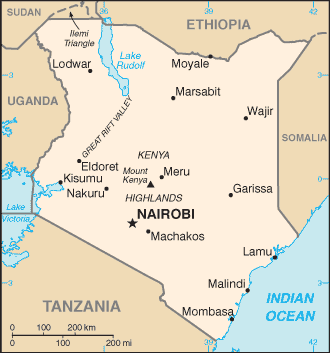Kenya Map Courtesy CIA World Factbook
Fossils found in East Africa suggest that protohumans roamed the area more than 20 million years ago. Recent finds near Kenya's Lake Turkana indicate that hominids like Homo habilis and Homo erectus lived in Kenya from 2.6 million years ago. The colonial history of Kenya dates from the establishment of a German protectorate over the Sultan of Zanzibar's coastal possessions in 1885, followed by the arrival of the Imperial British East Africa Company in 1888. Incipient imperial rivalry was forestalled when Germany handed its coastal holdings to Britain in 1890. During the early part of the 20th century the interior central highlands were settled by British and other European farmers, who became wealthy farming coffee. By the 1930s approximately 30,000 settlers lived in the area and were offered undue political powers due to their effects on the economy. The area was already home to over a million members of the Kikuyu tribe, most of whom had no land claims and lived as itinerant farmers. To protect their interests, the settlers banned the growing of coffee, introduced a Hut tax, and the landless were granted less and less land in exchange for their labour. A massive exodus to the cities ensued as their ability to provide a living from the land dwindled.
From October 1952 to December 1959, Kenya was under a state of emergency arising from the Mau Mau rebellion against British rule. The governor requested and obtained British and African troops, including the King's African Rifles. In January 1953, Major General Hinde was appointed as director of counter-insurgency operations. The situation did not improve due to lack of intelligence, so General Sir George Erskine was appointed commander-in-chief of the colony's armed forces in May 1953, with the personal backing of Winston Churchill. The capture of Waruhiu Itote (General China) on 15 January 1954 and the subsequent interrogation led to a better understanding of the Mau Mau command structure. Operation Anvil opened on 24 April 1954 after weeks of planning by the army with the approval of the War Council. The operation effectively placed Nairobi under military siege and the occupants were screened and the Mau Mau supporters moved to detention camps. May 1953 also saw the Home Guard officially recognized as a branch of the Security Forces. The Home Guard formed the core of the Government's anti-Mau Mau strategy as it was composed of loyalist Africans, not foreign forces like the British Army and King's African Rifles. By the end of the Emergency the Home Guard had killed no less than 4,686 Mau Mau, which amounted to 42% of the total insurgents. The capture of Dedan Kimathi on 21 October 1956 in Nyeri signified the ultimate defeat of the Mau Mau and essentially ended the military offensive. The first direct elections for Africans to the Legislative Council took place in 1957. Despite British hopes of handing power to "moderate" African rivals, it was the Kenya African National Union (KANU) of Jomo Kenyatta, which formed a government shortly before Kenya became independent on December 12, 1963. A year later, Kenyatta became Kenya's first president. At Kenyatta's death in 1978, Daniel arap Moi became President, and in democratic multiparty elections in 1992 and 1997 won re-election. In 2002, Moi was constitutionally barred from running and Mwai Kibaki was elected President.
|
|||||||||||||||||
 Kenya (pronounced as KEN-ya) is a country of East Africa, bordering Ethiopia, Somalia, Sudan, Tanzania, Uganda and the Indian Ocean. Nairobi is its capital and largest city.
Kenya (pronounced as KEN-ya) is a country of East Africa, bordering Ethiopia, Somalia, Sudan, Tanzania, Uganda and the Indian Ocean. Nairobi is its capital and largest city.